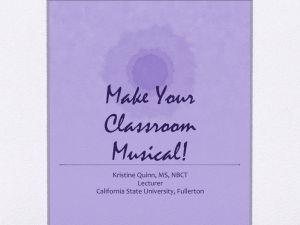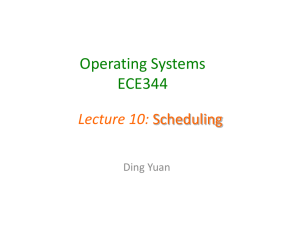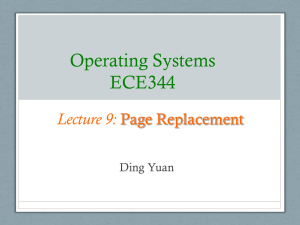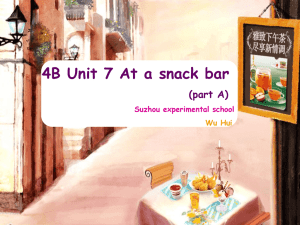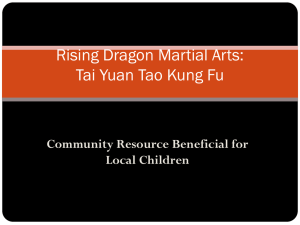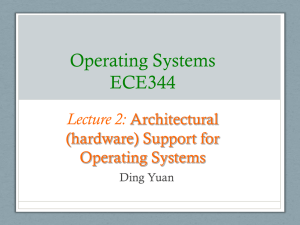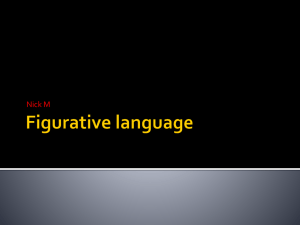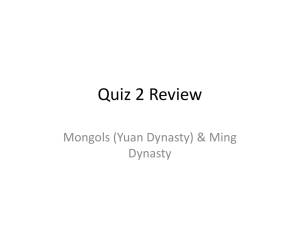lec1_intro - Computer Engineering Research Group
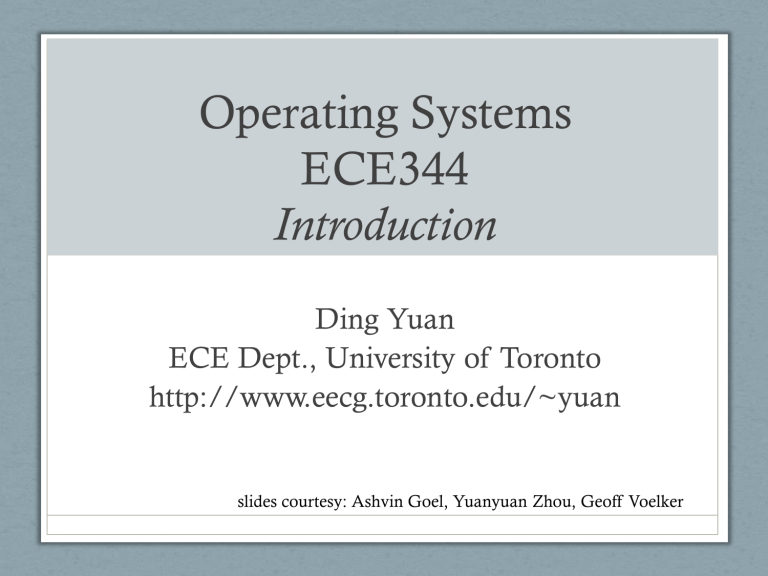
Operating Systems
ECE344
Introduction
Ding Yuan
ECE Dept., University of Toronto http://www.eecg.toronto.edu/~yuan slides courtesy: Ashvin Goel, Yuanyuan Zhou, Geoff Voelker
Content of this lecture
• Course information (personnel, policy, prerequisite, agenda, etc.)
• Why learning OS?
• What is an OS? What does it do?
• Summary
2 Ding Yuan, ECE344 Operating System
Why learning OS?
• Fulfill requirement?
• Operating System knowledge is important
• http://www.youtube.com/watch?v=-3Rt2_9d7Jg
• Which course is this?
• http://matt-welsh.blogspot.ca/2010/10/in-defense-of-mark-zuckerberg.html
• Software companies love OS students
• Most big software companies have system positions
• Academic research in OS is very influential
3 Ding Yuan, ECE344 Operating System
Goals of this course
• Understand operating system concepts
• How OS works, and more importantly, why ?
• What are the reasons motivated each design?
• Basis for future learning
• Get hands dirty
• You will implement a real OS
• Hands-on problem solving skills!
• Face a problem, solve it, instead of come up with a theory and find applications
4 Ding Yuan, ECE344 Operating System
Personnel
• Instructor:
• Ding Yuan ( yuan@eecg.toronto.edu
)
• Office hour: 8:30 – 9:30 AM, Wednesdays
• Office: Sandford Fleming 2002E
• Homepage: http://www.eecg.toronto.edu/~yuan
• TAs:
• David Lion, Yongle Zhang, Xu Zhao, others TBA
5 Ding Yuan, ECE344 Operating System
Prerequisite
• Programming experiences (e.g., ECE244)
• You will be programming in C
• Computer organizations (e.g., ECE243)
• What is an Instruction (e.g., load, store)?
• What is CPU? Memory? Registers?
• What is Stack? Stack pointer?
• What is Program Counter (PC)?
6 Ding Yuan, ECE344 Operating System
Course Contents
7
• Overview of computer hardware
• Threads and processes
• Synchronization and concurrency
• Scheduling
• Memory Management, Virtual Memory
• Disk Management and File Systems
• Advanced topics
Ding Yuan, ECE344 Operating System
8
Lab Assignments
• We will be using the OS161 system from Harvard
• Uses a simple MIPS emulator (sys161)
• Initially, we provide a barebones OS
• You write a simple Unix-like OS by the end of the course!
• Runs on Linux machines in UG Workstation Labs
• Can also download and install on any Linux machine
Ding Yuan, ECE344 Operating System
What to Expect From Lab Assignments
9
• Building an OS is difficult
• Perhaps the hardest lab in your undergraduate study
• OS: one of the hardest programs to write & debug
• Principles may sound easy, implementation is extremely hard
• The labs give specifications, not implementations
• “God (or devil) is in the detail”
• Hack into a large, unfamiliar code base and implement additional features
• You will spend a lot of time on the lab assignments
• Allows for imagination
• Allows for errors and frustration
• Lab instructions ask that you design well, before you code
• Assume that you will do the design/coding outside lab hours
Ding Yuan, ECE344 Operating System
But it is rewarding!
• Solid understanding of how an OS works
• Appreciations on the implementation efforts that make things work
• Technical capability
• Again: OS is one of the hardest programs to write and debug
• Quickly hack into unfamiliar code base
• You will work in groups of 2 for the lab assignments
• Make sure you know what your partner is implementing
• Learn to coordinate and be efficient
• Form your group by January 12 th , 11:59PM
• Send me email with the subject “ECE344 group information”
10 Ding Yuan, ECE344 Operating System
11
Suggested Textbooks
Modern Operating Systems, 4 th Edition
(Main textbook)
Andrew S. Tanenbaum and Herbert Bos
Operating Systems: Principles and Practice
(Further reading)
Thomas Anderson, Michael Dahlin
Ding Yuan, ECE344 Operating System
Communications
12
• Class web site
• Somewhere in the Internet, your job to find it
• Provides slides, agenda, grading policy, etc.
• All information regarding the labs
• Piazza (See course homepage) used for discussion
• Q/A & discussion with peers, TAs, prof
• Bonus marks: each instructor endorsed answer will get 1 bonus marks, maximum: 2 marks
• Encourage you to help others
• UoT Portal used for Grades only
Ding Yuan, ECE344 Operating System
13
Grading
• Exams
• Mid-term - 25%
• Final - 45%
• Assignments
• Labs - 30%
• Policies
• No extensions to deadlines
• 20% penalty per day submitted late
Ding Yuan, ECE344 Operating System
Exam
• Midterm
• Covers first half of class
• Final
• Covers second half of class + selected material from first part
• Project-related knowledge may be included in the exams
• So do your project and do NOT copy!
14 Ding Yuan, ECE344 Operating System
Cheating policy
• Academic integrity
• Your work in this class must be your own – we have zero tolerance policy towards cheating of any kind and any student who cheats will get a failing grade in the course
• Both the cheater and the student who aided the cheater will be held responsible for the cheating
• We have tools to detect software plagiarism
15 Ding Yuan, ECE344 Operating System
How NotTo pass ECE344
• Do not come to lecture
• It’s nice out, the slides are online, and material in the book anyway
• TRUTH: Lecture material is the basis for exams
• It is much more efficient to learn through discussion
• Copy other people’s project
• It is cheating!
• How can you answer the questions in midterm or final exams?
16 Ding Yuan, ECE344 Operating System
How NotTo pass ECE344 (2)
• Do not ask questions in lecture, office hours, or piazza
• It’s scary, I don’t want to embarrass myself
• TRUTH: asking questions is the best way to clarify lecture material at the time it is being presented
• “There is no such things as stupid question…”
• Wait until the last couple of days to start a project
• The project cannot be done in the last few days
• Repeat: the project cannot be done in the last few days!
17 Ding Yuan, ECE344 Operating System
Before we start
• Any questions?
• Do you think this will be a hard class?
18 Ding Yuan, ECE344 Operating System
• Anyone?
What is an OS?
• Give a few names of an OS?
• Desktops?
• Smart phones?
19 Ding Yuan, ECE344 Operating System
What is an OS?
• “Code” that:
• Sits between programs & hardware
• Sits between different programs
• Sits between different users
• But what does it do?
• Managing the hardware resource
• Provide a clean set of interface to programs
• A good OS is a piece of software that normally you shouldn’t notice of its existence
• But you feel the pain if it goes wrong
• Real life analogy?
• Government
20 Ding Yuan, ECE344 Operating System
OS is…
• Software layer between hardware and applications
• The OS is “all the code that you didn’t have to write” to implement your application
21 Ding Yuan, ECE344 Operating System
An example comparing life with/without OS
Life with an OS file = open (“test.txt”,
O_WRONLY); write (file, “test”, 4); close (file);
Life without an OS
• Blocks, platter, track, and sector
• Where is this file on disk? Which platter, track, and sectors?
• Code needs to change on a different system
22 Ding Yuan, ECE344 Operating System
OS and hardware
• The OS abstracts/controls/mediates access to hardware resources (what resources?)
• Computation (CPUs)
• Volatile storage (memory) and persistent storage (disk, etc.)
• Communication (network, modem, etc.)
• Input/output devices (keyboard, display, printer, etc.)
23 Ding Yuan, ECE344 Operating System
Benefits to Applications
• Simpler
• no tweaking device registers
• Device independent
• all disks look the same
• Portable
• same program runs on
Windows95/98/ME/NT/2000/XP/Vista/Windows
7/Windows 8
• Worry less about interference from other applications
24 Ding Yuan, ECE344 Operating System
What does an OS do?
• Resources
• Allocation
• Protection
• Reclamation
• Virtualization
25 Ding Yuan, ECE344 Operating System
What does an OS do?
• Resources
• Allocation
• Protection
• Reclamation
• Virtualization
• Finite resources
• Competing demands
• Examples:
• CPU
• Memory
• Disk
• Network
26 Ding Yuan, ECE344 Operating System
What does an OS do?
• Resources
• Allocation
• Protection
• Reclamation
• Virtualization
• You can’t hurt me,
I can’t hurt you.
• Some degrees of safety and security
27 Ding Yuan, ECE344 Operating System
What does an OS do?
• Resources
• Allocation
• Protection
• Reclamation
• Virtualization
• The OS gives,
The OS takes away
• Some times involuntarily
28 Ding Yuan, ECE344 Operating System
What does an OS do?
• Resources
• Allocation
• Protection
• Reclamation
• Virtualization
• Illusion of infinite, private resources
• Memory vs. disk
• Time-shared CPU
29 Ding Yuan, ECE344 Operating System
Why you want to learn
OS?
• Foundation to other software
• Databases, Browsers, Computational software, … …
• OS is one of the hardest software piece to write & debug
• Directly talks to hardware (very ugly interfaces)
• Abstract into clean interfaces
• They are BIG
• Lines of code:
• Windows Vista (2006): 50M (XP + 10M)
• Linux 3.6: 15.9 M
• Android 4.0: > 1M
30 Ding Yuan, ECE344 Operating System
Why you want to learn
OS?
• Many OS concepts (e.g., protection, resource management) is needed in other places
• E.g., browser
• OS is used everywhere
• Your car is running on Linux/Windows
31 Ding Yuan, ECE344 Operating System
Before the next class
• Browse the course web
• Start thinking about partners for project groups
• Read chapter 1
• See me up front if you have any questions
• Let the fun (or grind) begin!
32 Ding Yuan, ECE344 Operating System
